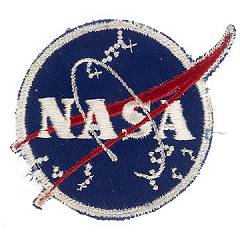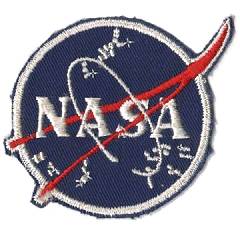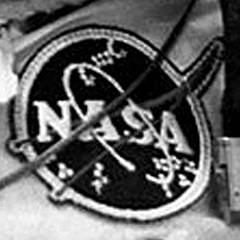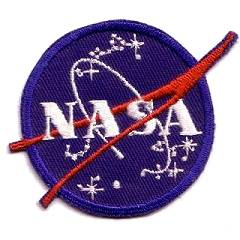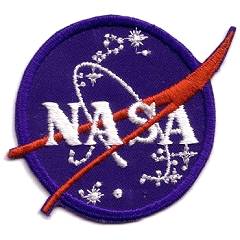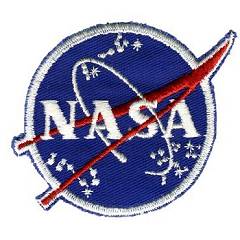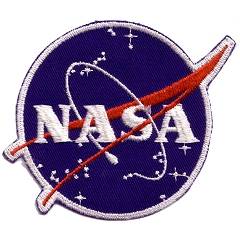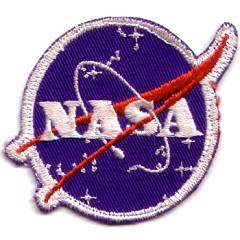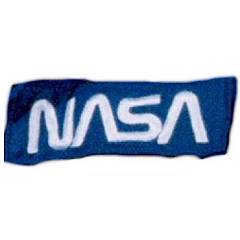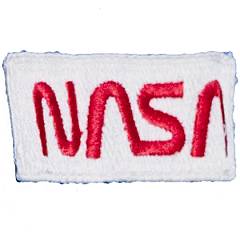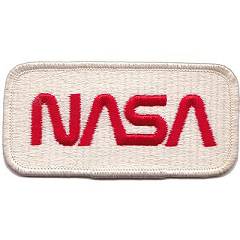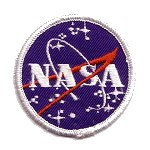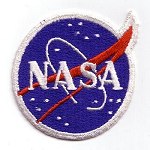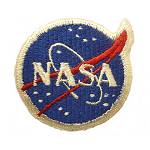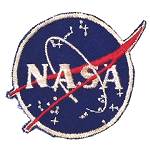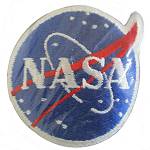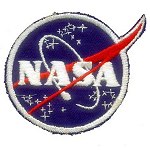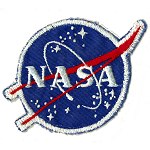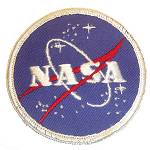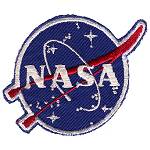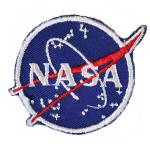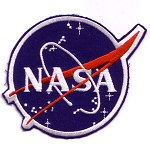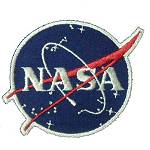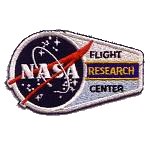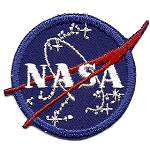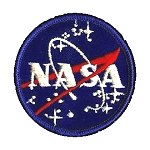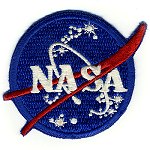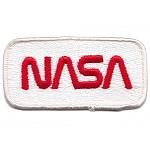NASA insignia patches

It may seem odd to include a section on NASA logo patches in a site dedicated to crew patches but the patch designs detailed below were either worn by the crews on their actual spacesuits (for the Mercury and Gemini projects and for Apollo 1) or worn on their flight suits immediately after the missions (from Apollo 7 onwards). To my mind this certainly makes them worthy of a place in any serious space patch collection.
After studying the best images I could find of the patches used on the various missions it's clear that at least four different versions of the classic "meatball" vector insignia design have been used during the Mercury-Gemini-Apollo period. I refer to these designs as Types I, II, III and IV, with a fifth type thrown-in for good measure along with a variant 7 apparently worn in training by both Mercury and Apollo astronauts.
I also briefly cover the "worm" logotype patch that was introduced at the time of the Shuttle program.
NASA Vector (aka "meatball") Patches
NASA Vector ("meatball") Patch - Type I
This white bordered NASA insignia patch is the version worn by the astronauts during the Mercury program, as can be seen in the closeup photo details shown here.
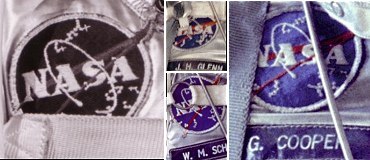
Use did extend into the Gemini program, as evidenced by an example sold from the Armstrong collection in 2018 which had been worn on one of his flightsuits.
NASA Vector ("meatball") Patch - Type II
This white bordered NASA insignia patch is the version worn by the astronauts during the Gemini program, as can be seen in the closeup photo details shown here.
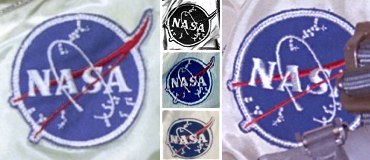
Although very similar in appearance to the Type I patch, this design can be distinguished by slightly less bold lettering. In addition, where the Type I patch has an open V-shaped pattern of three stars under the right leg of the final "A" (pointing up to the right), the Type II patch has a fourth star which turns it into a diamond shape.
An example of the Type II patch that was apparently taken from one of Gus Grissom's Gemini 3 space suits is shown here. This scan was kindly provided by Mike Zolotorow.
Note that most examples of this patch have the top left corner of the final "A" bisected by the vector but a few have the vector completely overlaying the top corner (leaving no white thread visible to the upper left) and slightly more bold lettering. You can see this more clearly in these images of patches sewn to James McDivitt's Gemini-era flight suits, from images kindly provided by Dave Keeler. Another example of this variant was sold recently on eBay which had apparently been sent by the Gemini X crew as a gift.
NASA Vector ("meatball") Patch - Type III
For Apollo 1 the NASA logo patch used by the crews on their space suits was the white-bordered version shown here. The same design was used by the crews of Apollos 7, 8, 9 and 11 on their post-flight jump suits. Note that the Apollo 9 crew in fact had two different sets of jump suits, one with this patch and the other with the blue-bordered Type IV patch.
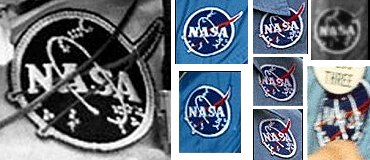
Although very similar in appearance to the Type II patch, this design can be distinguished by the fact that the top of the last "A" overlays the red vector, whereas in the earlier versions the red vector cuts through the top of the "A". The point of the vector is also thicker in this version than the earlier ones. Finally, the serif on the letter "N" is much more pronounced, with the top left of the "N" almost reaching the left border.
NASA Vector ("meatball") Patch - Type IV
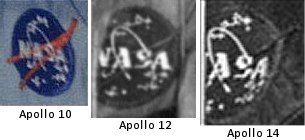
I had originally thought there was only one version of the blue-bordered NASA insignia patch used by the Apollo crews but in fact there are two distinct versions which I now identify as Type IV (previously identified as blue bordered variant 2) and Type V (the more common version).
The earliest appearance of the first version of the patch is probably in S68-46603 & 68H-730, which show the Apollo 7 crew in training in August 1968. Cunningham wears a blue bordered Type IV patch on his jump suit while the other two have the white bordered Type III patches.
Another early appearance is on the Apollo 8 recovery ship in December 1968. Photo 68-H-1415 shows Jim Lovell with astronaut Mike Collins who is wearing a blue-bordered Type IV patch on his jump suit.
The Type IV patch was worn by the Apollo 9 crew on one of the sets of blue flight suits they wore on the U.S.S. Guadalcanal at events after the recovery. The other set of flight suits had the white-bordered Type III patches.
The Type IV patch also appears to be the version worn by the Apollo 10 crew after that flight and is clearly identifiable on the flight suits worn by the Apollo 12 crew in quarantine, and on Roosa's flight suit after Apollo 14. Mitchell's patch is not clearly visible in the Apollo 14 photos I have and Shepard wore a white border patch on his flight suit (possibly a Type II Gemini-era version) as shown in KSC-71P-168.
High res images show that the Apollo 15 crew (at least Scott and Worden) also wore the Type IV patch, but on Apollo 13, 16 and 17 the crews wore the type V patches.
One of these patches, described as having been flown aboard Gemini 12, was sold at auction in 2007 by a relative of Buzz Aldrin. Whilst the Gemini 12 flown status is questionable it certainly seems likely to have come from Aldrin. The patch appears to have been removed from a garment, and may possibly have been used on a blue flight suit by Aldrin.
NASA Vector ("meatball") Patch - Type V
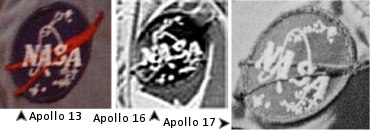
Although very similar in appearance to the Type IV patch the Type V version can be differentiated by the much bolder large stars. The small star beneath the top-most large star is also displaced more to the right in this version and the two small stars inside the upper left end of the orbital ellipse are more widely separated.
This is the blue bordered patch that was apparently sold commercially by AB Emblem. Early cloth back versions of the commercial patch are thus the same as those worn by the later Apollo crews.
It should be noted that Jack Swigert wore a white border patch on his post-recovery flight suit as shown in 70-H-0641, although he also wore a second suit with a Type V blue border patch that is visible in other post-recovery photos.
NASA Vector ("meatball") Patch - Type VII
This version of the white bordered NASA insignia patch was not originally part of the highlighted list of crew-associated versions as no examples were seen worn on Mercury or Apollo crew flight suits or space suits.
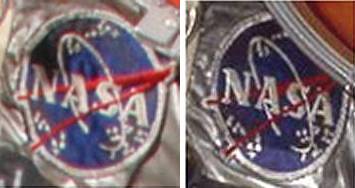
So far I've been unable to find any photographs showing Glenn wearing this version of the patch, and it certainly wasn't the type worn during his flight. In theory the patch could have been added to the training suit after it was retired by Glenn, although given its condition is does look contemporary to the suit.
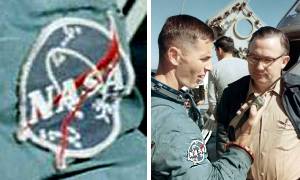
However, it was subsequently noticed by Liem Bahneman that Bill Anders also wore this variant on his suit during Apollo 8 water egress training as shown in the photos on the right, taken in October 1968.
Although there's no evidence so far that this version was actually worn during any flights it does now have clear crew association.
NASA Vector Patches used at the Dryden Flight Research Center

Although this site is concerned mainly with the Mercury, Gemini and Apollo projects, NASA research pilots at the Dryden Flight Research Center also wore NASA vector logo patches at times and it is interesting to include these vintage patches here.
From the available photographic evidence [Annex] it appears that at least two different vector patch designs were worn by NASA's research pilots from about 1960 onwards.
These two different patches are clearly shown in the photo on the right, taken in 1966 after the first flight of the HL-10. Bruce Peterson's flight suit has a large (roughly 4") NASA vector patch on the chest and a smaller (roughly 3") version on the shoulder.
These two patch designs do not match those used on the Mercury, Gemini and Apollo programs, but are consistent in all appearances of the NASA vector patch at the DFRC in photos from 1960 through to at least 1972. The distinctive pattern of stars on the two sizes of DFRC patch is very similar, making it likely that the same manufacturer produced both designs for NASA. I've decided to refer to these designs (at least for now) as DFRC 4" and DFRC 3".
NASA Vector ("meatball") Patch - DFRC 4"
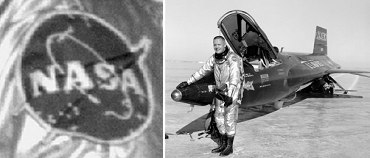
A variant of this patch design with slightly narrower lettering, but with an identical pattern of stars, appears to have been introduced by 1966 and can be seen as the larger of the two patches worn by Bruce Peterson on his HL-10 flight suit in the photo at the start of this section. The version with narrower lettering can be seen on the suits of various NASA research pilots in photos through to at least 1972[Annex].
These two variants may be analogous with the Type I and II vector patches used on the Mercury and Gemini programs respectively, where the earliest patch (1959-1963) had thicker lettering and the later version (1964-1966) narrower lettering.
Note that very similar-looking later versions of this patch exist with plastic coatings on the reverse, as noted in the Other Patches section below, so collectors need to be wary when looking to buy one of the extremely rare original patches.
NASA Vector ("meatball") Patch - DFRC 3"
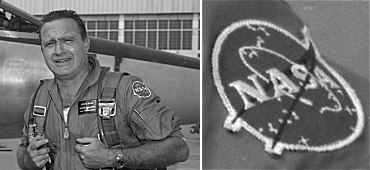
According to Dryden historian Peter Merlin, examples of this particular patch were given to NASA personnel assigned to the X-15 project at Dryden in March 1960. X-15 personnel can be seen wearing the patch on their hats in photo E-6460. One of these hats, complete with its original patch, can be seen in this photo, courtesy of Peter Merlin.
It appears that the example shown in my scan has broader writing that the versions shown in most of the photos, so perhaps as with the 4" version there are at two variants with narrower and broader lettering. The layout of stars and all other details appear to be identical.
NASA "Worm" Logotype Patch
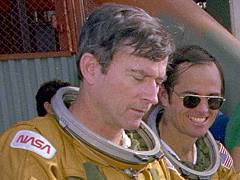
In 1975, NASA replaced the classic "meatball" vector insignia design with a new 'modern' logotype design that was commonly referred to as the "worm".
The Apollo-Soyuz crew were the first to use this new logotype insignia but only wore it in beta cloth form.
However, on the Shuttle flights the astronauts wore embroidered "worm" logotype patches on their flight suits, as can be seen on STS-1 Commander John Young's flight suit in the photo on the right.
Between the ASTP mission in 1975 and the first Shuttle space flight in 1981 a couple of different embroidered versions of the "worm" logotype were used as detailed below.
Blue on white NASA "worm" logotype patch (1977 onwards)
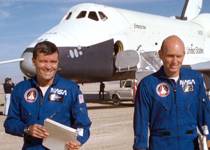
The first appearance of an embroidered version of the "worm" logotype insignia seems to be that worn in 1977 by the Shuttle ALT (Approach and Landing Test) crews on their dark blue flight suits, as shown in the photo on the right.
The patch appears to be executed in white thread on blue cloth rather than having an embroidered background.
The same style of patch can be seen used on dark blue flight suits in various later photos, including in some images of the Group 8 astronauts in 1978, and in the official STS-8 crew portrait (the close-up image of the patch above is from this photo).
Early NASA "worm" logotype patch (1978)

Executed in red thread on a white background, this square-cornered version of the "worm" logotype patch was worn on the dark blue flight suits of many of NASA's Group 8 astronauts in their 1978 individual portraits, as shown in Guion Bluford's portrait image on the right.
However, by the time the more senior astronauts had their Shuttle-era portraits taken in 1979 it had been replaced by the Lion Brothers version.
This early version of the "worm" patch was not worn on any Shuttle flights.
NASA "Worm" logotype Patch (1979 onwards)
The patch can be identified by a distinctive vertically-ribbed fill pattern in the white background where the more common AB Emblem version of the patch has a regular fill pattern without any ribbing.
This patch was apparently manufactured by Lion Brothers, although why NASA chose not to use their official patch supplier to produce this one patch is something of a mystery.
The fact that this patch is so scarce implies that it was probably not made available commercially and was only supplied directly to NASA.
Other Embroidered NASA Insignia ("Meatball") White-Bordered Patches
NASA Vector ("meatball") Patch - Type VI
This smaller white-bordered version of the NASA vector patch is clearly visible in this photo on suit tech Joe Schmitt's hat during suiting-up activities prior to the Apollo 11 launch.
Ed Mitchell is also pictured wearing this patch on a flight suit in this photo taken of the Apollo 10 backup crew during training.
What appears to be a similar patch is also visible on Jim McDivitt's coveralls in a NASA publicity film made prior to the launch of Apollo 9. The image is not very clear but the fine details look a little different from the version shown above.
NASA Vector ("meatball") Patch - White-bordered variant 1
I believe this patch was produced by Universal Commemorative of Los Angeles, CA, since I've seen it sold with their Apollo 11 and 12 patches several times.
My thanks to Peter Merlin for pointing out that this patch was used by the crew of Ironman One in the 1969 movie Marooned.
NASA Vector ("meatball") Patch - White-bordered variant 1b
Although at first glance this patch looks almost identical to the white-bordered variant 1 patch above it is actually significantly smaller in size and also has slightly narrower fonts with less prominent serifs.
NASA Vector ("meatball") Patch - White-bordered variant 2
A white-bordered patch vintage patch which doesn't match any of the known crew versions. It is most similar to the DFRC 3" patch but the lettering is much skinnier than that visible in photos and the pattern of stars is subtly different. Image courtesy of Ron Goode.
NASA Vector ("meatball") Patch - White-bordered St Louis Emblems
This white-bordered patch was identified in a sealed package with St Louis Emblems labeling. Although the design is very similar to white-bordered variant 1 there are distinct differences. In particular the stars at lower left are anchored to the border, the top star is touching the top border, and the two stars in the bottom section are almost touching.
NASA Vector ("meatball") Patch - White-bordered variant 3
This white-bordered patch has only the point of the vector extending beyond the body of the patch, but is quite distinct from the Universal Commemorative version.
NASA Vector ("meatball") Patch - White-bordered variant 4
An example of this white-bordered patch came from the collection of a North American Aviation employee who worked on the Apollo project. The pattern of stars is quite distinct from any other white bordered variant.
The patch can also be seen in NASA photo 69p-648 which shows NASA biomed space engineer Judy Sullivan wearing one of these patches during the Apollo 11 suit-up operation.
NASA Vector ("meatball") Patch - White-bordered variant 5
This small version of the NASA insignia is seen infrequently. It is not known who produced it, although at least one example of this patch seems to have been used by Grumman.
NASA Vector ("meatball") Patch - White-bordered variant 6
An example of this white-bordered patch was seen on an old NASA JPL jacket. The most distinctive feature of this patch is the extra-thick ends of the tails of the red vector.
NASA Vector ("meatball") Patch - White-bordered variant 8
This patch is very similar in overall design to the white-bordered variant 2 patch and has a virtually identical layout of stars. However, this variant is missing the top left extended white serif on the last "A" of "NASA". Additionally, the rays of the cross-shaped stars on this version are slightly less pronounced and the white border around the extended ends of the red vector is noticeably thicker in this variant.
I would still be tempted these might be two runs of essentially the same design but in fact the pattern of long anchor threads on the reverse of the two patches is totally different, proving that they are indeed different designs.
NASA Vector ("meatball") DFRC 4" replica patch
The design for this modern patch has clearly been copied directly from the original 4" Dryden patch. The modern version has a slick plastic backing and much sharper details as is typical of modern patches.
NASA Vector ("meatball") DFRC 3¾" coated patch
This patch has the same design as the original 4" Dryden patch but the body measures 3¾" in diameter instead of 4". The patch has a slick plastic coating on the reverse which makes it a modern version (late '70s at the earliest). Despite the size difference and the coated back the overall look of this patch is pretty close to that of the vintage original 4" patch.
NASA Flight Research Center patch
This unusual Flight Research Center version of the NASA insignia is extremely rare in its original form, but a very convincing modern replica exists.
Other Embroidered NASA Insignia ("Meatball") Blue-Bordered Patches
NASA Vector ("meatball") Patch - Blue-bordered variant 1
This blue-bordered patch is similar to the Type IV but has extra stars in the lower left quadrant. An example was found recently which was apparently part of a set of patches distributed to collectors by AB Emblem in the early 70s. Also part of the set was a Type V meatball emblem.
This would maybe make it a later variant of Type IV or perhaps AB's first version of the vector patch. Either way it does not appear to have been used by any of the crews.
NASA Vector ("meatball") Patch - Blue-bordered variant 3
This is a blue-bordered version of the small Type V patch. Image courtesy of Ron Goode.
NASA Vector ("meatball") Dallas Cap & Emblem Blue-bordered patch
Previously identified as Blue-bordered variant 4, this patch has been identified by Kenny Suit as having been produced by Dallas Cap & Emblem. Its fully-embroidered background distinguishes it from the majority of vintage NASA logo patches.
Other Embroidered NASA "worm" logotype patches
A-B Emblem NASA "worm" logotype patch
Although similar in appearance to the "worm" logotype insignia worn by the Shuttle astronauts this was not actually the version used by NASA through to STS-27 at least. The crew-worn version had a distinctive vertically ribbed pattern to the white fill thread whereas the AB version has regular fill.
Footnotes
[1] Examples of NASA Vector Type I patch sales:
Heritage Space Auction lot 52138 Nov 1, 2018, sold at $15,000 from Armstrong collection, worn
[2] Examples of NASA Vector Type II patch sales:
eBay item no. 330285915180 Nov 16, 2008 sold at $405
eBay item no. 220785605494 May 24, 2011 sold at $335.51 [On
powder blue flight suit]
Lunar Legacies Auction lot 109 Aug 20, 2011 sold at $1351.25 (inc fees)
eBay item no. 130796843395 Nov 18, 2012 sold at $371.74 [variant style, with signed letter from Gemini X crew]
eBay item no. 321022547194 Nov 19, 2012 sold at $699.00
Regency/Superior Space Auction lot no. 121 May 24, 2013 sold at $476
RRAuction Lot 57 Apr 28, 2015 sold at $4993.10 on Cooper flight jacket
Lunar Legacies auction lot 234 Jul 25, 2015 sold at $2261 on Cunningham flight suit
eBay item no. 252046368426 Aug 10, 2015 sold at $260.59 [lightly soiled]
Heritage Space Auction lot 50130 May 19 2017, on Lovell flight jacket
Heritage Space Auction lot 52167 Nov 1, 2018, on Armstrong flight suit
eBay item no. 113683903253 Mar 14, 2019 sold at $549.95 (with other items)
eBay item no. 323766047953 Apr 4, 2019 sold at $700.00 (best offer accepted)
[18] Examples of NASA Vector Type III patch sales:
eBay item no. 223444881797 Mar 18, 2019 sold at $876.33 (on Apollo-era coveralls)
American Space Museum & Space Walk of Fame auction lot 38 Apr 10, 2021 sold at $780
[3] Examples of NASA Vector Type IV blue-bordered patch sales:
Lunar Legacies Space Auction lot 42 Nov 20, 2011 sold at $86.25 (inc. fees)
eBay item no. 360415923591 Dec 11, 2011 sold at $100.99
eBay item no. 230719894648 Dec 19, 2011 sold at $10 [Buy-it-Now]
eBay item no. 400841755395 Jan 18, 2015 sold at $103.50
eBay item no. 151755670280 Jul 30, 2015 sold at $19.01
eBay item no. 252840604222 Apr 17, 2017 sold at $64 [buy-it-now]
eBay item no. 253186198487 Jan 10, 2018 sold at $94 [offer accepted]
[4] Examples of NASA Vector Type V blue-bordered patch sales:
eBay item no. 180812807021 Feb 8, 2012 sold at $36
eBay item no. 140702544025 Feb 19, 2012 sold at $23.50
eBay item no. 140739753014 Apr 22, 2012 sold at $37.59
eBay item no. 390878257298 Jul 10, 2014 sold at $52.50
Heritage Space Auction lot 52220 Nov 1, 2018, sold at $2,312.50 from Armstrong collection
eBay item no. 133302180186 Mar 21, 2020 sold at $9.99
eBay item no. 293511563055 Mar 21, 2020 sold at $10.80
eBay item no. 293539206655 Apr 12, 2020 sold at $32.99
eBay item no. 265109093300 Jan 18,2022 sold at $59.95
[5] Examples of DFRC 4" patch sales:
eBay item no. 360346225801 Feb 28, 2011 sold at $162.09 (2 identical examples poorly listed)
eBay item no. 270736916959 Apr 22, 2011 sold at $75 [On jacket. Poorly listed]
eBay item no. 360443552105 Mar 25, 2012 sold at $103.51 [Very light soiling]
eBay item no. 360463571820 Jun 9, 2012 sold at $168.50 [Mounting traces to reverse]
eBay item no. 261439650716 Apr 29, 2014 sold at $195 [buy-it-now]
Astro-Auction item no. 1422733116 Jan 31, 2015 sold at $100
eBay item no. 261952615369 Jul 6, 2015 sold at $169 [buy-it-now]
Space Walk Hall of Fame Charity Auction lot no. 60 Apr 2, 2016 sold at $780
[6] Examples of DFRC 3" patch sales:
eBay item no. 250371300478 Feb 12, 2009 sold at $207.49
eBay item no. 221301986650 Oct 27, 2013 sold at $180.45
eBay item no. 141642736997 Apr 26, 2015 sold at $206.25
Space Walk Hall of Fame Charity Auction lot no. 44 Apr 2, 2016 sold at $1,500
Heritage auction lot 50081 May 9, 2019 sold at $6,875 from Armstrong collection
eBay item no. 255196677284 Oct 25, 2021 sold at $39.99
[7] Examples of NASA "Worm" Logotype Lion Brothers patch sales (1979+) :
eBay item no. 321877921534 Oct 2, 2015 sold at $19.99 [buy-it-now]
eBay item no. 264682136702 Mar 29, 2020 sold at $115
eBay item no. 115473924422< Jul 31, 2022 sold at $25
[8] Examples of NASA Vector Patch - Type VI patch sales:
eBay item no. 180812804166 Sep 4, 2011 sold at $36
[9] Examples of white-bordered variant 1 patch sales:
[Listings removed as too common to justify tracking]
[10] Examples of white-bordered variant 2 patch sales:
eBay item no. 141598159012 Mar 15, 2015 sold at $130.45
eBay item no. ? May 1, 2017 sold at $74.95 [offer accepted]
[11] Examples of white-bordered variant 3 patch sales:
eBay item no. 250825308005 May 30, 2011 sold at $98.99
eBay item no. 180812807021 Feb 8, 2012 sold at $58
eBay item no. 140855920381 Sep 30, 2012 sold at $78
eBay item no. 291583903862 Oct 14, 2015 sold at $39
[12] Examples of white-bordered variant 4 patch sales:
eBay item no. 270958830771 Apr 23, 2012 sold at $97
eBay item no. 270995839637 Jun 17, 2012 sold at $97
eBay item no. 141259347237 Apr 24, 2014 sold at $56
eBay item no. 391381882110 Feb 14, 2016 sold at $112.55
Lunar Legacies Space Auction Lot 61 Sep 23, 2023 sold at $109.80
[13] Examples of white-bordered variant 5 patch sales:
eBay item no. 251193360274 Dec 8, 2012 sold at $12.05
[14] Examples of white-bordered variant 6 patch sales:
eBay item no. 232440671248< Aug 8, 2017 sold at $32.50
[15] Examples of white-bordered variant 7 patch sales:
eBay item no. 112341541641 Mar 16, 2017 sold at $15
[16] Examples of DFRC 3¾" coated patch sales:
eBay item no. 140842494575 Sep 9, 2012 sold at $110.25
[17] Examples of blue-bordered variant 1 patch sales:
eBay item no. 400511400070 Jul 26, 2013 sold at $? [best offer]
eBay item no. 360768617850 Jan 5, 2014 sold at $34.95
eBay item no. 391283300069 Oct 3, 2015 sold at $7.99
eBay item no. 391283300069 Oct 3, 2015 sold at $7.99
eBay item no. 332463329021 Jan 24, 2018 sold at $3.15
eBay item no. 362364372093 Aug 6, 2018 sold at $75
[18] Examples of white-bordered variant 8 patch sales:
Space Walk Hall of Fame Charity Auction lot no. 307 Feb 20, 2021 sold at $300
